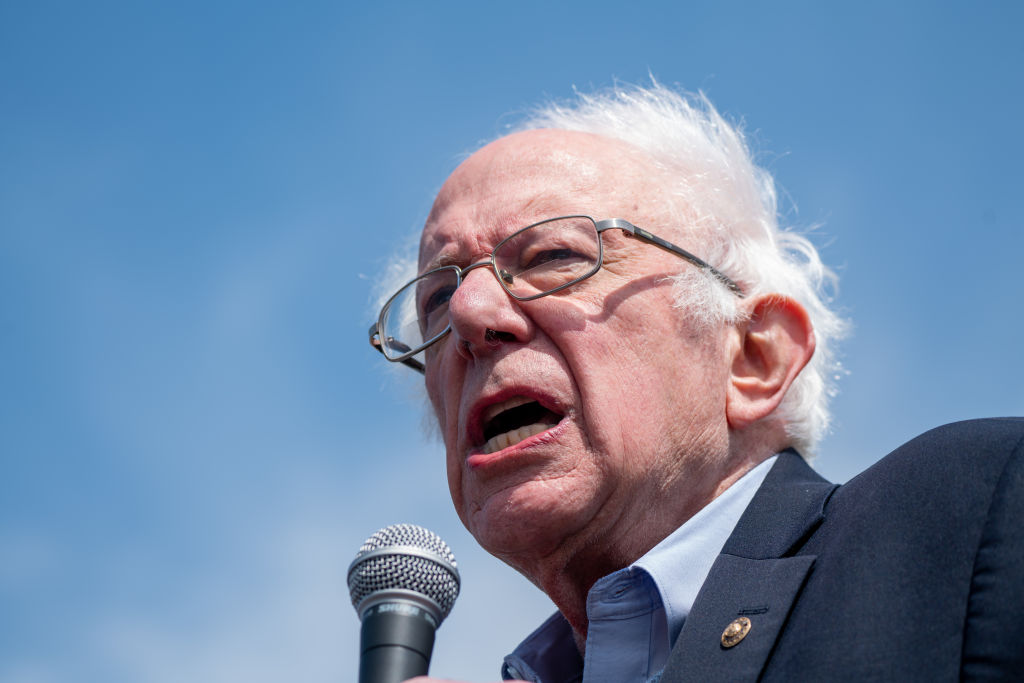
This article is part of The D.C. Brief, TIME’s politics newsletter. Sign up here to get stories like this sent to your inbox.
Last week, a lot of pragmatic Democrats in Washington let out a groan at the news that Sen. Bernie Sanders’ inner circle was laying the groundwork for a possible 2024 White House bid, which would be his third in as many presidential cycles and once again give voice to a progressive message that so far hasn’t landed wins in battleground territory.
The self-described democratic socialist from Vermont has animated a distinct corner of the liberal wing of the Democratic Party, which, to be clear, is not where Sanders calls his home when he’s not seeking its White House nomination. (In his last election to the Senate, he won the Democratic primary but declined it, opting to run as an independent during the general election.) Sanders’ agenda of Medicare for All, student-loan forgiveness, and massive social-welfare spending has an audience, but it hasn’t been a winning coalition to this point. There’s a significant chunk of the Democratic establishment that openly loathes Sanders for standing in the way of a clean nomination for Hillary Clinton in 2016, despises him for not rallying his base behind her more quickly while he instead wrote a book that made him a millionaire, and questions why he forced Joe Biden to defend his own policy beliefs across multiple focus groups in exchange for an endorsement two years ago.
And don’t even get the centrists and moderates in the Democratic Party started on Sanders. A certain think tank just south of TIME’s Washington Bureau has devoted an inordinate amount of time and effort on derailing Sanders-style socialism in the party.
Democrats last nominated an avowed hardcore liberal when they put up Michael Dukakis 1988 and he lost 40 states. The successful Democrats who have won the Oval Office were skilled—but closeted—centrists who convinced the party’s base they were safe and unthreatening. Bill Clinton wrapped himself in a third-way kaftan, Barack Obama ran the first time denying marriage equality, and Joe Biden was simply a sufficient anti-Trump. All of which is to say this: Democrats often flirt with the liberal edge of their party but ultimately have always come home to a candidate who represents the most electable contestant.
The memo put out by his allies that Sanders hasn’t closed the door on a 2024 run laid bare the problems the party faces. Reliable Democrats freaked out about the prospects of winning the next presidential election if there’s another potential primary where the frontrunner faces a Sanders-esque candidate. But they need to keep calm and not get ensnared by the sticky Vermont maple syrup. After all, there are some caveats in the signals coming out of Burlington. If you read between the lines, the Bernie bros aren’t actually preparing for an intra-party war. They’re just tilling the soil.
For one, Sanders’ allies aren’t signaling an active primary against Biden, who is publicly telling supporters and staff alike that he is preparing for a re-election bid. They’re only carefully saying Sanders would be open to running again for the White House if Biden chooses to forgo a second term.
For another, Sanders has yet to win the nomination, despite having run against two of the most easily attacked frontrunner candidates Democrats had put forward in decades. Hillary Clinton’s baggage is legendary, yet she still bested Sanders. Biden, whose record now is the product of 50 years in public office, often reflected the mores of the era, but those sometimes don’t look quite right when seen through today’s lens. Yet he prevailed.
Finally, it’s actually in Biden’s interest for Sanders and his pals to float this. Historically, the party in the White House faces steep losses in Congress in its first midterm elections, and Biden’s polling suggests this fall may be more brutal for Democrats than most. If Democrats are to stand a chance, they need every friendly voter, volunteer, and donor activated. A drop-off in Sanders’ voters in 2016 may well have cost Clinton the election; two surveys found roughly one-in-10 Sanders supporters voted for Donald Trump that year. Having lived through four years of Trump, those Sanders voters didn’t make the same choice in 2020, even if they didn’t exactly love Biden. The 2024 election could be a sequel if Trump attempts his expected comeback: but whether it’s a sequel to 2016 or 2020 may depend on the voters Democrats can inspire.
Biden’s Democratic Party isn’t capturing the imagination of the progressive wing of the party. But Sanders still knows the liberal zeitgeist. He can animate the activists who remain on his lists but perhaps on the sidelines. If the prospect of a Sanders 2024 campaign remains an option, they’ll keep clicking, retweeting, and donating. And, in doing so, they may accidentally build the foundation of a Biden re-election bid. In quietly signaling to the base that Sanders is open to a third bid, his allies may actually be preparing for the most unlikely of roles: keeping Biden in office.
Make sense of what matters in Washington. Sign up for the D.C. Brief newsletter.
More Must-Reads From TIME
- The 100 Most Influential People of 2024
- The Revolution of Yulia Navalnaya
- 6 Compliments That Land Every Time
- What's the Deal With the Bitcoin Halving?
- If You're Dating Right Now , You're Brave: Column
- The AI That Could Heal a Divided Internet
- Fallout Is a Brilliant Model for the Future of Video Game Adaptations
- Want Weekly Recs on What to Watch, Read, and More? Sign Up for Worth Your Time
Write to Philip Elliott at philip.elliott@time.com